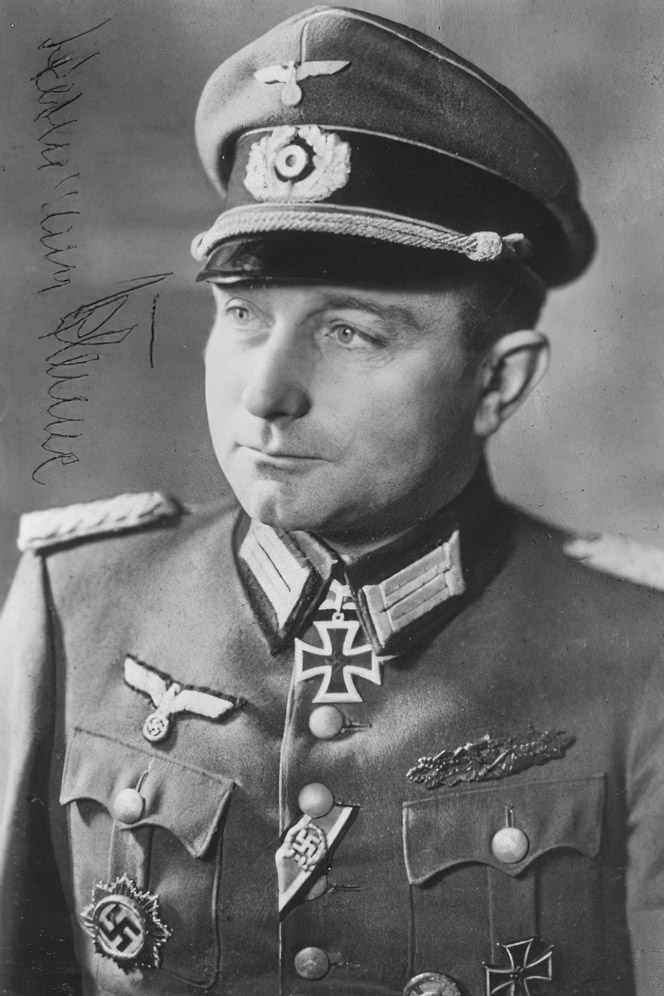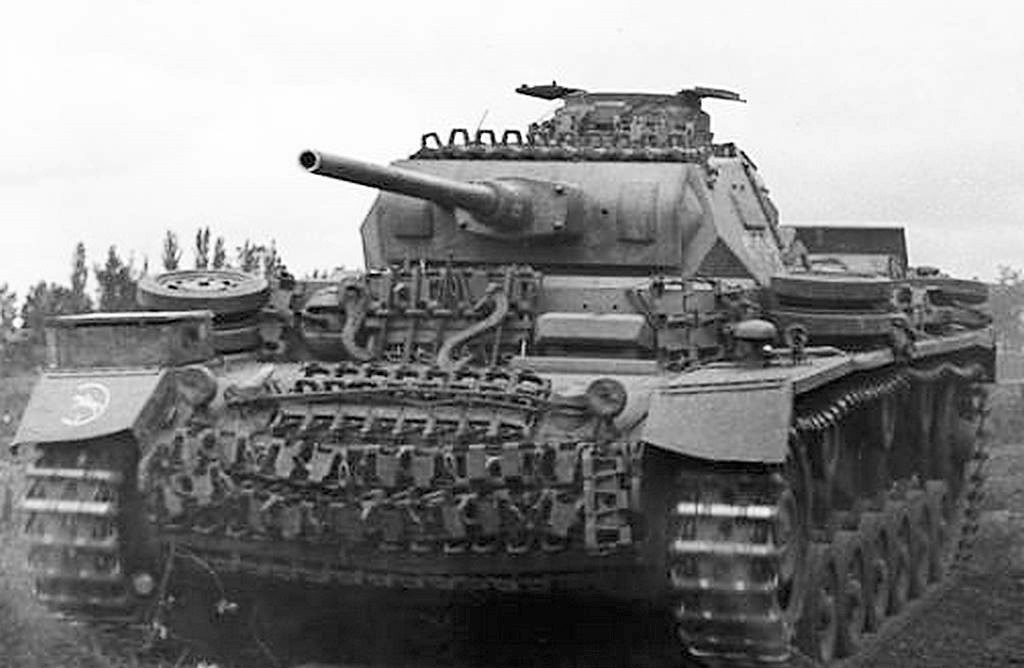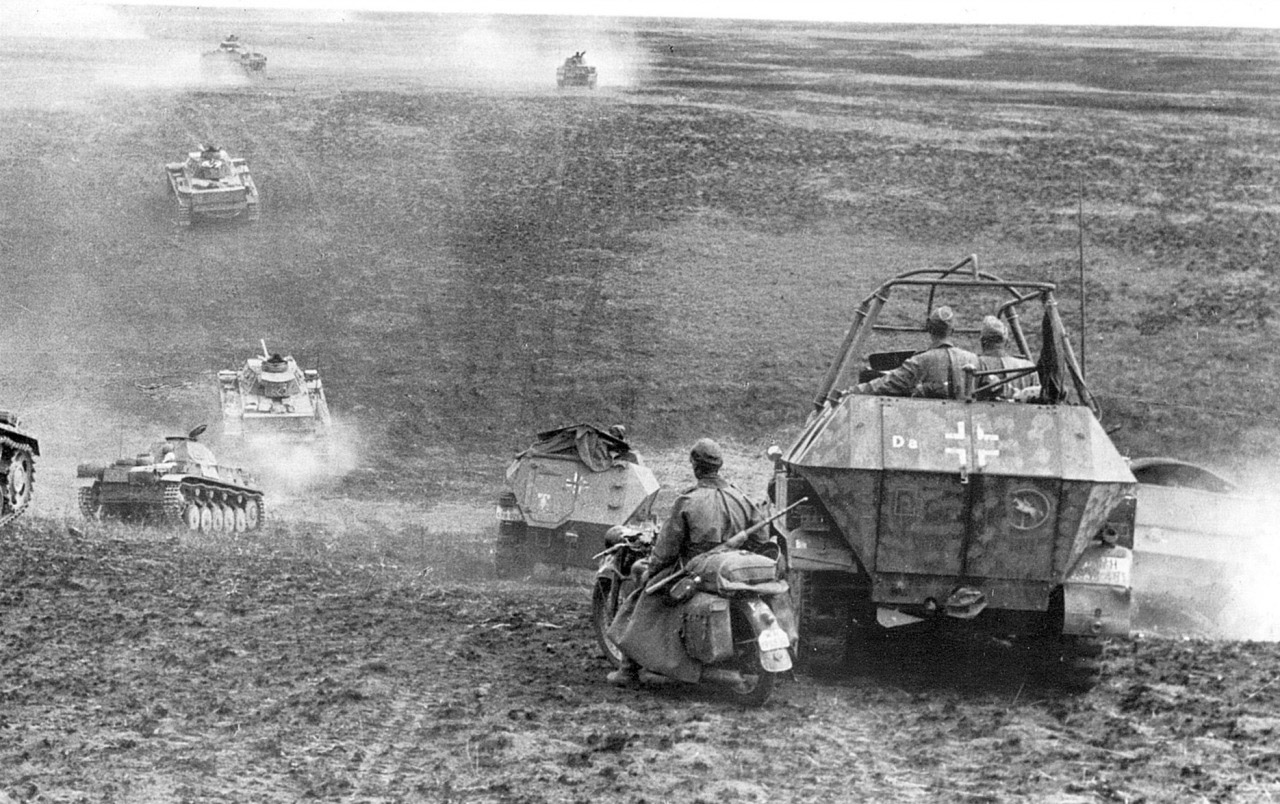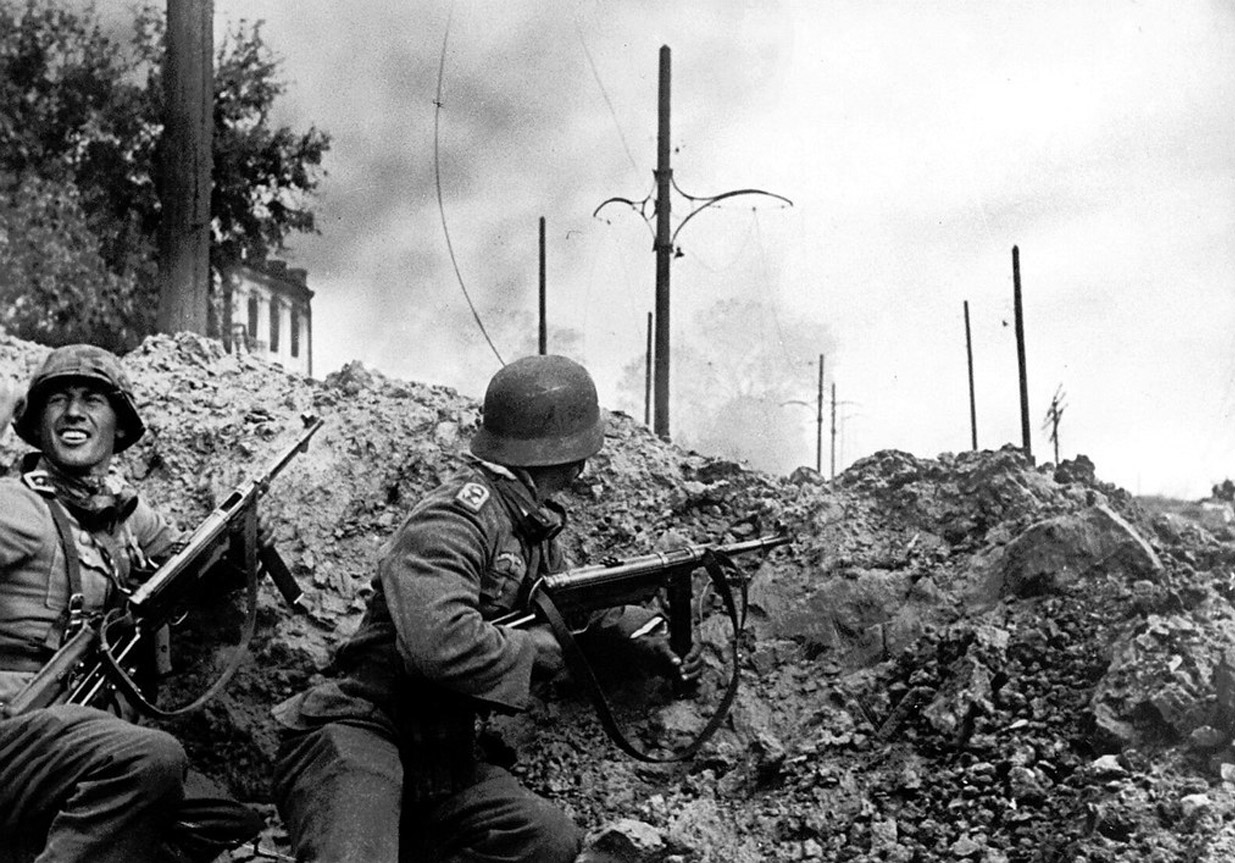

Interview with Hermann Blume, Knight's Cross holder and veteran of the 24th Panzer Division. Dusseldorf, 1989.



Interview with Hermann Blume, Knight's Cross holder and veteran of the 24th Panzer Division. Dusseldorf, 1989.

Thanks for letting me meet with you, it is an honor. If I may, can I ask how you came to the 24th Panzer Division?
Hermann: Yes, it was not always the 24th, at first we were a cavalry unit and then with the war we became motorized. I started my time in the mounted regiment 1, as I had a love for the old traditions of the German cavalry. The first war made the horse only good for transport and reconnaissance.
The 24th Panzer Division fought on the Eastern Front, what was your opinion of the Russian soldier?
Hermann: Yes, he was a soldier like any other for the most part. There were good ones and bad ones. They fought well, and were a very determined foe for us. Because of the Cold War there has been an effort to portray then as sloppy drunks, who were uneducated and prone to crime.
You can not imagine the surprise German forces faced when the T34 showed up. We had nothing to match it except the 88mm flak gun. The 3.7 only knocked on the door to tell them we were here. The short barrel panzers struggled to knock them out as well. They had weapons that easily defeated our light-skinned armor, a complete shock I assure you.
We were very foolish to strike the Soviet Union, in my studying this decision, it is evident to me the Führer was misled into thinking they were much weaker. Many of us could not believe we were attacking such a large nation, yet at first we prevailed and pushed them back.
I witnessed some of their men in action, and they fought with tenacity and bravery, relieving a German unit. I understand any of them captured were killed later. I ate with some in 1944 at a meeting, and they seemed very convinced to free Russia of Stalin. The Ukrainians back then hated Stalin; I remember being welcomed as a friend in many villages and towns.
When war broke out we had to give up the horse for motorcycles and armored vehicles. Of course this resulted in some fuss and new training, cavalry men can be quite stubborn, like our steeds. My regiment was eventually pulled into the newly created 24th Panzer Division, the panzer became the new steed.
Since most men were former cavalry men the new division symbol was a steed leaping over an oxer
[a hedge with a guardrail running along one side at a distance of two or three feet and often a ditch along the other side to prevent cattle from passing through it -ed].
That was our nickname, the Leaping Horsemen. Most of us were already combat veterans from Poland and France. Our commander before the 24th was von Broich who went on to great fame in Africa.
I can tell you these castings are false. It is true some were bastards and prone to commit crimes, like the commissars, but most soldiers held discipline and a toughness we admired. They had weapons that we were not prepared for in the beginning, and they gave us quite a bloody nose at times.
It took our designers until 1942 to create better panzers for us. If only we had access to them in the beginning the war would have been won. Germany was not prepared for any type of war, let alone a world war taking on the world’s four superpowers. It was a task for which we lacked men and material.
I would see many prisoners, and I was on the staff of the division so I saw the interrogations. The Russian soldier was well-treated, and in many cases came to fight for us later on. Not many know this today, but in 1943 efforts were started to form armies out of prisoners. Of course they could not be reliable I understand, but some really took the fight to their former comrades.
These places were so friendly to us that our general released some of the men captured so they could return to their farms. I had heard there were rumblings of anger when we would not allow them to join us. German forces had to separate the loyal ones from the agent provocateurs that remained behind.

[Above: A Panzer III Ausf J, 24th Panzer Division. Note the division's leaping horse symbol on the far left of the tank.]
I wanted to ask you also about the relationship with the civilians. I have always been taught that Germany was very cruel to the occupied people.
Hermann: Well not so in the 24th’s areas, it may be true in areas with militia or police units who fought partisans. The German army was very correct with the civilian population. We had standing orders on the treatment and dealings with the people. They were not slaves, abused, or harassed.
I can share with you that the civilians would often times come and ask to trade foods or need help. We had a bad language barrier so many times we had no idea what they wanted, but using hands and gestures it usually worked out. Our men had to be reminded to not fall for the temptations of the Ukrainian girls when on leave.
I understand you were awarded the Knight's Cross, can you tell me about the awards you won?
Hermann: It is all in the past, but back then I was called a hero of the Reich. Yes, I was awarded the Knight's Cross, but also I have the German Cross, Iron Cross, and Honor Roll Clasp. I came into the Knight's Cross in 1945, right at the end. I was in the recon unit of the division and helped stall many Russian attacks.
By March 1945 when I received the Knight's Cross all of our units had been reduced to shells of what we used to be. We had young soldiers who were so full of zeal for the fight still. Yet they lacked true combat experience, and you only get that by facing the enemy. We had many needless casualties due to the young who were reckless.
What was it like in Stalingrad?
Hermann: Well, I will tell you it was hell, young man, pure hell for all of us. The 24th was part of the 6th army back then. We had the task of taking the city, and cutting off the oil supply to Stalin. I remember that summer well, it was hot and humid. The division was a motorized panzer division and had mostly the MKIII panzer.
I remember the ordeals having to move them off to the rear. Many chose to stay behind to help us, as they were angry their comrades would not let them leave. In our HQ we had many who helped us with food, intelligence, and building fortifications. Many of the women would help repair uniforms and prepare meals.
Our sister unit had a young woman who was part of the ballet of Stalingrad, and she would do a dance routine for the men to enjoy, taking their minds off the war if for only a short time. She was killed later on during an artillery barrage.
The battle went well for us at first, we had good supply lines, and the enemy seemed to be on his last leg. However just when we thought we won, more would appear. They had ways of getting men and supplies across the Don River, and we never could choke them off.
Many attacks were made to seize the pocket, but they had massed artillery and air attacks that broke these up. From here they could launch small local attacks to take back a building that had just been taken. I was given a task for training staff men for combat to be ready for these sudden attacks.
As time bore on we became weaker as the enemy became stronger. He had a new leader I now know, and they started shooting any soldier not brave enough to charge our lines. This caused them severe losses but it was effective as they came in waves. Our men had to hunker down in buildings and trenches.
The real problem came in November of 1942 when a massive attack struck our weak allies on the flanks and sealed off the 6th army. This made a large pocket form, which the enemy then went to work on closing. As I said I was saved from the final outcome in all of this. I know the final weeks were very bad for my men.
The 24th was wiped out, but reformed in 1943 and several survivors of the battle gave a good indication of what happened. The enemy would shoot down the Red Cross planes carrying wounded men. I could not understand this level of cruelty. If the Russian soldier had any flaws it would be they could be prone to blind hatred that caused them to commit acts of terror.
I do know in some areas the SS rounded up Jews to be sent to ghettos or labor allocations for rebuilding. I saw nothing of the sort with army units. We were in combat and had no time to deal with such things. We had to be alert at all times at the front as the enemy could be on us in a lightening bolt.
So you asked how the relations were between us, and in spite of the Soviet Union today, back then they were very good. We were at war with the idea of Bolshevism and the world revolution, not the innocent people. They hated Stalin and his henchmen with a passion, but Stalin convinced many that the war was against Russians.
I also hold a very special badge to me, the silver badge for wounded soldiers. I was wounded 8 times during the war. I can thank these wounds for saving me a worse fate at times. The 24th was in Stalingrad, and completely wiped out. Being away saved me from capture, where so few ever came back.
[Only five percent ever came back after being captured in Stalingrad. 95,000 of 100,000 never returned from captivity in Russia. They were betrayed and given to the communists by their traitorous leader Paulus, who prevented breakout attempts, hid rations and supplies and defied Adolf Hitler's stern orders to hold out. He later became a mouthpiece for communism, speaking over the radio to German soldiers, trying to convince them to betray their country like he had.-ed]
I was wounded where I lost this arm while surrounded so that was quite an ordeal. I also received the combat clasp which was given for so many days of encounters with the enemy front lines.
I was placed on the staff as a first adjutant. We broke the enemy lines protecting the city, and forced our way in, as other divisions pushed the enemy away from Stalingrad. It looked like it would crack easily. The Luftwaffe bombed the city before we came in to soften the positions up, but it made it easy for the defenders.
We also knew the people would be a hindrance so fliers were put in bombs and shells telling them to leave the city. The thinking was it would be a burden on the enemy to feed them. It turned out they forbade any retreat, so we ended up having to care for many thousands who came to us for food and shelter.

[Above: Elements of 24th Panzer Division advance towards Stalingrad in August 1942. The freedom of the Russian people was at hand. The future of Europe and the world was at stake. But alas, American production and Lend Lease prevented Europe's victory over communism and world slavery. Again, note the leaping horse symbol on the far right of the vehicle.]
I have read there were bad feelings between the army and Waffen-SS, did you find this to be true?
Hermann: In some cases yes, it is true. The SS was a purely political army that was all volunteers and had many non-Germans in the ranks. It was the first real NATO type formation. They fought with the army for control of much coveted supplies, and this caused friction.
It was said they were prone to acts of cruelness against the civilians, I know they fought partisans often which was cruel business. I had no problems with the men of the Waffen-SS; I found them to be excellent soldiers who showed extreme bravery. They could be fanatics due to their political role, they believed in a final victory even up to the very last days.
Do you think Germany could have won the war in the east?
Hermann: Yes, of course I do, history shows us that victory can be had by anyone under the proper circumstances. I am of the opinion that if we had attacked Russia in early May 1941 and drove on to the oil in the south harder we could have cut off Stalin. We would have had an extra 2 months of campaigning.
The generals thought in terms of old warfare, they wanted to take the enemies' capitals, here is where Hitler was actually right, he wanted oil first, but was talked out of it. I know he was very angry at this and fired many who persuaded him to change. If the south would have fallen, Stalin would have been hard pressed to keep going.
Also the Ukrainians hated the Russians and the Bolshevik system that tried to wipe them out. Efforts to recruit them to help us really did not start until 1943; this should have been done from the very first day of war. I saw them welcome us as liberators of their land. Everywhere we went they cheered us on and offered small tokens.
You might find this interesting, but my nation was not prepared to fight a war, and did not fully get prepared until 1943. I never understood this, why we went to war without fully having every resource available to us. This was the topic of many lively debates at the front. We could tell Stalin was fully prepared for a war in 1941, in spite of what the Soviet Union claims today.
[It's now been revealed from many sources, including the autobiography of Germany's greatest pilot, in fact the greatest ace of all-time, Hans Rudel, that Stalin was preparing for an invasion of Europe. Rudel saw from the air a massive build-up of men and materiel on the borders of Russia. The Germans were shocked and unprepared for the massive amount of prisoners they gained in the first days of the invasion of Russia. This explains why Germany attacked Russia. On a further note, it is interesting that Mr. Blume says that it would have been better to have attacked Russia a few months earlier. Everyone now knows they had intended to, but had to delay the invasion to help the Italians in Greece. This also led to the invasion of Yugoslavia due to a British coup there.-ed]

[Above: The iron men of the 24th Panzer Division in southern Stalingrad. They were invaluable to the Wehrmacht's capture of southern Stalingrad in September 1942. While their military objective failed, partially due to traitors, such as Friedrich Paulus, they succeeded in winning the hearts of the free-thinking people of the world of the future, who rightfully saw their sacrifice as the epic struggle for freedom and ultimate martyrdom that it was. It is an interesting fact that only the German military surrendered, never the National Socialist government. Interesting, because you cannot surrender an idea, nor can you stop an idea whose time has come.]